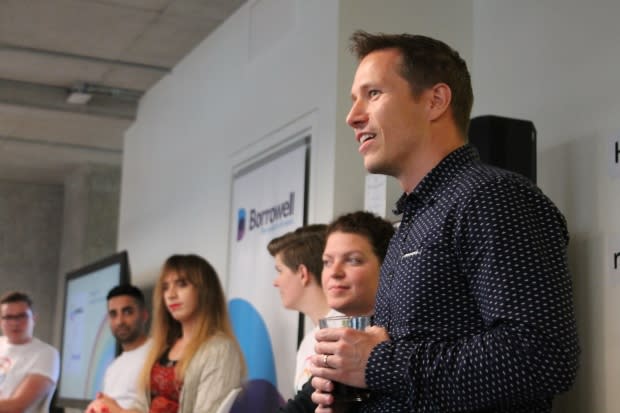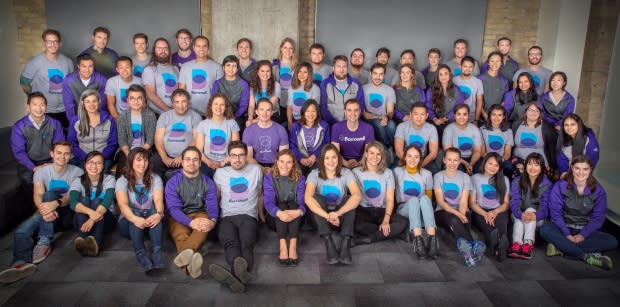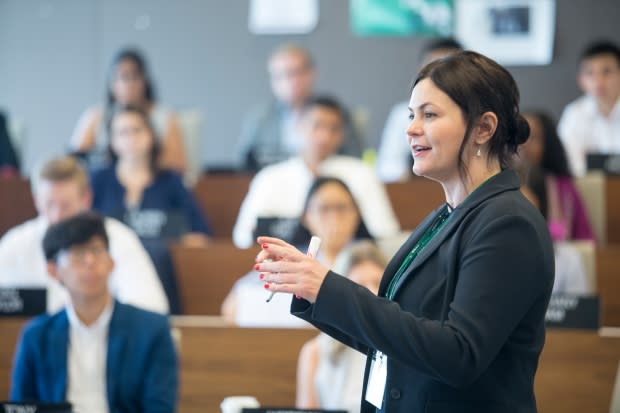LGBT investing group Gaingels makes its 1st Canadian deal
Gaingels, an investment group whose members invest their money in companies with progressive social values and LGBT leadership, has made its first deal in Canada.
The group has invested $360,000 in Borrowell, a Toronto-based fintech company that provides free credit scores and reports to users, along with personal loans and referrals for credit cards and mortgages.
"Obviously, [for] Pride Month, it's time to celebrate diversity and inclusion," said Chad Molleken, one of Gaingels's Canadian investors.
Gaingels investors were impressed with the company's commitment to diversity and inclusion in hiring; half of Borrowell's staff of 68 identifies as female, as does almost half of its leadership team.
Additionally, Larissa Holmes, the company's vice-president of talent, is a member of the LGBT community.

Borrowell raised $57 million in a previous round of financing two years ago. The company will announce next week a new round of financing, and the Gaingels investment is a modest — but meaningful — part of that.
While it's not a huge sum of money, Holmes believes it sends a huge message.
"We're kind of drawing a line in the sand and saying that this is something that matters to us as a business," she said.
How Gaingels works
Gaingels — its name is a mix of "gay angels" and "gaining from angels" — doesn't consider itself a venture capital fund. Rather, the group operates a network of members who hope to make money and make change at the same time.
In any particular deal, each member can decide whether they want to participate and how much they want to invest. But any business Gaingels supports must commit to having diverse and inclusive staffing at all levels.
Started in the U.S. in 2014, Gaingels did its first deal in 2015. Since then, roughly 200 Gaingels' members have invested more than $20 million US in some 70 companies, with most deals between $200,000 and $500,000.
There are currently Gaingels chapters in New York, San Francisco and Los Angeles, as well as London and Australia. And now in Toronto.

Molleken met the founders of Gaingels while living in New York and invested in an American deal with the group. The group recognized Canada's growing tech ecosystem and LGBT community as an opportunity to grow their network.
In 2018, Molleken and a few others began the process of setting up a Canadian branch. The Gaingels deal with Borrowell involved nine Canadian investors, and it took several months to find a deal they felt they could back.
Though Gaingels is often a source of seed capital for young companies, after a few networking events in Toronto Molleken said the pitches from early stage companies "weren't getting a lot of traction" with the group.
That led to the investment in the more established Borrowell.
And the timing of this first investment, falling during Toronto's Pride Month, may help grow the Gaingels brand in Canada, attracting both more investors and companies looking for funding.
Why LGBT investors are needed
The world of venture capital is not commonly perceived as inclusive; a 2016 U.S. study found that 37 per cent of LGBT entrepreneurs were not considered "out" to their investors, while 12 per cent of company founders said they thought being out would hurt them financially.
"The venture capital space has been very stuffed up for a very long time," said Oana Branzei, with the Ivey Business School at Western University in London, Ont.
"It is a system with a proven track record of discriminating against women, discriminating against populations that are untraditional — as in not conservative enough or not fitting the familiar moulds."

Branzei sees the Gaingels style of investment as potentially having the same kind revolutionary impact as the crowdfunding model. But Gaingels is really part of a movement toward community- or affinity-based investing, which has shared philosophical roots in socially responsible investing, or SRI.
Affinity investing could be thought of as a highly personalized form of SRI in which lenders put money into companies whose values they support, and companies led by people with whom they feel a sense of community and connection.
"Affinity investing to make money while empowering a particular community you belong to has notable differences from traditional mercenary angel investing and venture capital," Gaingels co-founder Paul Grossinger described in an editorial for Inc. "You and your peers tend to have an innate desire to help more entrepreneurs and companies in your community — in short it's harder to say 'no.'"
Gaingels was created in the same vein as female-focused investing groups, such as Golden Seeds (2005), Belle Capital (2009) and 37 Angels (2012). Other affinity-investing groups are based on school alumni networks, like the Red Bear Angels, of Cornell University, or the nationality-based group Digital Irish Angels.
The magic is beyond the money here. Much more important than the size of the deal is the attention they draw to these ventures. - Oana Branzei, with Western University's Ivey Business School
For Branzei, the benefit of affinity investing is that it has the authenticity and buzz of crowdfunding, combined with the credibility of a formal venture capital deal.
"The magic is beyond the money here," she said. "Much more important than the size of the deal is the attention they draw to these ventures."
In essence, Branzei said, a Gaingels investment could amount to a double endorsement: It sends a signal to other investors about both a company's value — and its values.
Looking ahead
With one round of financing already under its belt, Borrowell didn't feel it needed an endorsement from Gaingels, but Holmes recognizes that it could have an impact.
The Gaingels investment could lead to other deals and partnerships, she said, and possibly help the company recruit new staff.
"I hope it differentiates us; I hope the LGBTQ community stands up and says I want to work for them," Holmes said.

And while Gaingels Canada hopes to grow beyond Toronto in the future, the immediate goal is simply to complete a second deal before the end of the year, Molleken said.
Now an executive with an artificial intelligence company, in 2015 he co-founded AnyCard, an online platform that helps small businesses sell electronic gift cards.
As a company founder, Molleken knows just how critical early stage funding is for a new company. He says Gaingels can fill in a funding gap.
"Some of these founders may not have access to capital," he said. "So we're providing them a community [and] people they can trust, people that they can relate to.… Our $100,000 or $500,000 might make or break whether someone else follows on that investment."


